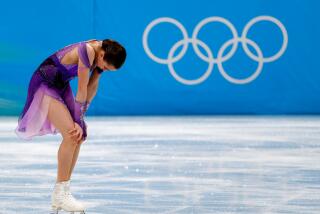Hungarian Stripped of Discus Title
- Share via
ATHENS — Track and field set an Olympic record for infamy and tied another Tuesday.
For the first time in a single Olympics, more than one athlete in the sport has lost a medal over drug testing.
Even worse: Both are gold medalists.
The latest culprit is discus champion Robert Fazekas of Hungary, disqualified after he failed to provide a urine sample after winning Monday night. All medalists are tested.
Women’s shotput champion Irina Korzhanenko of Russia was disqualified after testing positive for the anabolic steroid stanozolol.
The International Olympic Committee also announced Tuesday that high jumper Aleksey Lesnichiy of Belarus tested positive for the steroid clenbuterol after Friday’s qualifying, in which he finished last. That allowed track and field to tie its record for most drug violations at a single Olympics, three, set in 1992.
In its decision on the discus case, the IOC executive board said it had suspicions that Fazekas may have been trying to “avoid delivery of his own urine.” Because Fazekas refused to give a sample in front of witnesses, the IOC decision implied he could have been trying to carry drug-free urine to substitute for his own.
Only two track athletes previously were stripped of Olympic medals: Canada’s Ben Johnson (gold, 100 meters) in 1988, and Finland’s Matti Vainio (silver, 10,000 meters) in 1984.
Fazekas, who won the discus on Monday night with an Olympic record throw of 232 feet 8 inches, never got to wear the gold medal because the award ceremony wasn’t held until Tuesday night. The title went instead to Lithuania’s Virgilijus Alekna, who had finished second with a throw of 229 feet 3 inches. Another Hungarian, Zoltan Kovago, was bumped from bronze to silver. Fourth-place finisher Aleksander Tammert of Estonia moved to third.
At Tuesday’s ceremony, the scoreboard showed highlights from Sunday’s competition, including Alekna’s “winning throw.” Fazekas was listed as DQ, or disqualified. Alekna looked bemused as he stepped on the top podium to receive the gold. He held up his arms and then stood still for the Lithuanian anthem.
The IOC said the Hungarian delegation claimed Fazekas “was a deeply religious person who has always had difficulty to produce a sufficient quantity of urine in front of sample collectors.”
Fazekas provided 25 milliliters of urine, one-third short of the required minimum sample. He refused to give another sample, saying he wasn’t feeling well, the IOC said.
The Athens Olympics have produced a spate of doping cases.
Nine weightlifters have failed tests, including Greece’s Leonidas Sampanis, who was stripped of a bronze medal in the 137-pound class after testing positive for testosterone.
A Kenyan boxer was sent home after failing an out-of-competition test, and two Greek baseball players, a Swiss cyclist, a Spanish canoe team member and an Irish distance runner were among athletes banned before the games.
Two Greek sprinters, Costas Kenteris and Katerina Thanou, pulled out two days before the track and field events began in Athens after allegations that they ducked drug tests.
Fazekas, 29, was European champion in 2002 and silver medalist at the 2003 world championships. His coach is Jozsef Vida, who also coaches Adrian Annus, the Hungarian who won the hammer throw gold medal.
Fazekas, who is also a world-class hammer thrower, had been a modest performer for most of his career until his breakthrough in 2002, when he won the European and World Cup titles.
*
Associated Press contributed to this report.
More to Read
Go beyond the scoreboard
Get the latest on L.A.'s teams in the daily Sports Report newsletter.
You may occasionally receive promotional content from the Los Angeles Times.






